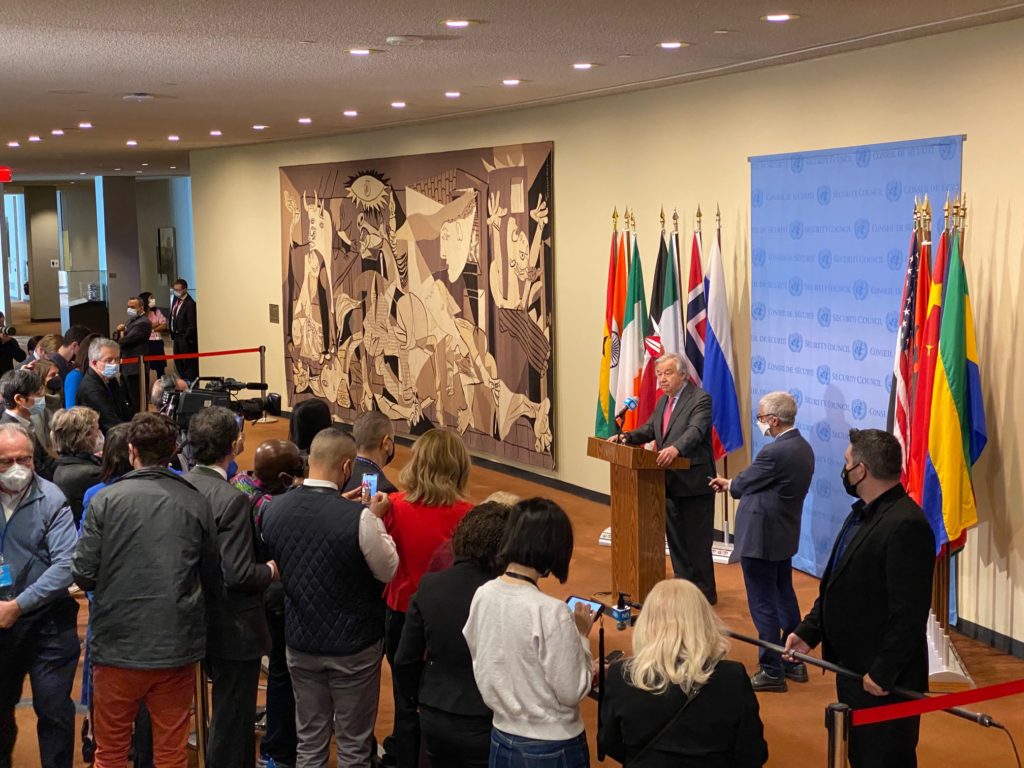New York, March 14 – The United Nations has established a Global Crisis Response Group on Food, Energy and Finance to assist the Ukrainian people living under terrifying conditions created by the Russian war, UN Secretary-General Antonio Guterres said.
“The country is being decimated before the eyes of the world,” Guterres told journalists at UN headquarters. “The impact on civilians is reaching terrifying proportions. Countless innocent people – including women and children – have been killed. After being hit by Russian forces, roads, airports and schools lie in ruins.”
He said in coming days the crisis group will consult member states “willing to champion the actions needed to carry forward the global emergency response that will be required for these looming crises. Make no mistake, everyday people, especially women and children, will bear the brunt of this unfolding tragedy.”
The war is getting worse and “whatever the outcome, this war will have no winners, only losers,” Guterres said.
He reiterated that the war brings back “the prospect of nuclear conflict, “once unthinkable, is now back within the realm of possibility,” calling for preserving the security and safety of nuclear facilities.
UN agencies working in Ukraine said 1.9 million people have become internally displaced inside the country and more than 2.8 million others have become refugees as people continued to escape across borders under harsh conditions, including women and children who are vulnerable to human traffickers.
Three UN agencies – UNICEF, UNFPA and WHO – issued an urgent appeal on March 13 for an immediate cessation of all attacks so the UN can provide humanitarian aid to the civilian population.
“Today, we call for an immediate cessation of all attacks on health care in Ukraine. These horrific attacks are killing and causing serious injuries to patients and health workers, destroying vital health infrastructure and forcing thousands to forgo accessing health services despite catastrophic needs.
“To attack the most vulnerable – babies, children, pregnant women, and those already suffering from illness and disease, and health workers risking their own lives to save lives – is an act of unconscionable cruelty.
“In Ukraine, since the start of the war, 31 attacks on health care have been documented via the WHO’s Surveillance System for Attacks on Health Care (SSA). According to these reports, in 24 incidents health care facilities were damaged or destroyed, while in five cases ambulances were damaged or destroyed. These attacks have led to at least 12 deaths and 34 injuries, and affected access to and availability of essential health services. WHO is verifying further reports, as attacks continue to be reported despite the calls for protection of health care.
“Attacks on health care and health workers directly impact people’s ability to access essential health services – especially women, children and other vulnerable groups. We have already seen that the health care needs of pregnant women, new mothers, younger children and older people inside Ukraine are rising, while access to services is being severely limited by the violence.
“For example, more than 4,300 births have occurred in Ukraine since the start of war and 80,000 Ukrainian women are expected to give birth in next three months. Oxygen and medical supplies, including for the management of pregnancy complications, are running dangerously low.
“The health care system in Ukraine is clearly under significant strain, and its collapse would be a catastrophe. Every effort must be made to prevent this from happening.
“International humanitarian and human rights law must be upheld, and the protection of civilians must be our top priority.
“Humanitarian partners and health care workers must be able to safely maintain and strengthen essential health service delivery, including immunization against COVID-19 and polio, and the supply of life-saving medicines for civilians across Ukraine as well as to refugees crossing into neighbouring countries. Health services should be systematically available at border crossings, including rapid care and referral processes for children and pregnant women.
“It is critical that humanitarian actors have safe and unimpeded access to reach ALL civilians in need wherever they may be. UNICEF, UNFPA and WHO are working with partners to scale up life-saving services and support to meet urgent health needs. We must be able to safely deliver emergency medical supplies – including those required for obstetric and neonatal care – to health centers, temporary facilities and underground shelters.
“Health care and services should be protected from all acts of violence and obstruction. Amidst the ongoing COVID-19 pandemic, which has already put health systems and health care workers under enormous strain, such attacks have the potential to be even more devastating for the civilian population. For the sake of health workers, and for all people in Ukraine who need access to the lifesaving services they provide, attacks on all health care and other civilian infrastructure must stop.
“Finally, we call for an immediate ceasefire, which includes unhindered access so that people in need can access humanitarian assistance. A peaceful resolution to end the war in Ukraine is possible.”
Signatures: UNICEF Catherine Russell, Executive Director; UNFPA Dr. Natalia Kanem, Executive Director;
WHO Dr. Tedros Adhanom Ghebreyesus, Director-General
United Nations correspondent journalists – United Nations correspondent journalists – United Nations correspondent journalists
United Nations journalism articles – United Nations journalism articles – United Nations journalism articles

